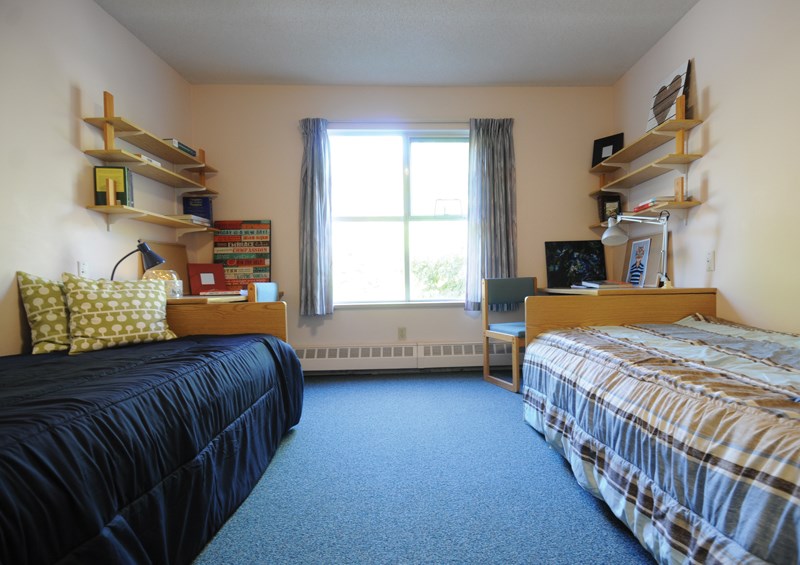There are now more than 100 Capilano University students bedding down each night at the school’s first residence buildings.
The school has a five-year lease on a former boarding school for international students at 2420 Dollarton Hwy., that includes three dormitory buildings and a dining hall.
“We saw a need from our students. We know that there are students who are struggling to find places to live or are not able to come to Cap because they couldn’t find housing in the Vancouver area,” said Chad Johnstone, student housing services manager.
It has been a hurried process, with the lease being signed in June and applications becoming available in July, painting and upgrades over the course of August and move-in day on Sept. 1.
The costs work out to be $550 a month for a shared room, $725 for a single or $950 for one of the three apartment style rooms that includes a private bathroom and kitchenette.

The prices are “totally fair” in the opinion of Dini Stamatopulos, a 24-year-old communications student.
More importantly, the residences have made the commute manageable, she said.
“The location is perfect,” said Stamatopulos who used to take transit to Cap from her home in Coquitlam. “You don’t want to be late for school and you don’t want to risk if there’s an accident or missed connection. I would spend about three hours a day, at least, commuting.”
All of the students are required to buy a $2,130 all-you-can-eat meal plan for the dining hall that lasts until the end of the semester. The school has contracted Chartwells to run the cafeteria, which has proved highly popular with students.
“The food is probably our biggest success story,” Johnstone said.
Seventy per cent of the rooms are rented out as doubles, meaning the roommates sleep just a metre or so away from one another. The lack of privacy was a big concern for Gabriela Pinheiro, a 25-year-old business administration student. But Pinheiro applied because she wanted a head start in getting to know the university and its students after she moved here from Brazil. And, apart from the co-ed washrooms, the living arrangements were easy to adjust to, Pinheiro said.
“I didn’t know I was going to feel as comfortable as I am feeling because I’ve never lived with someone before in the same room. It’s a different experience for me,” she said. “It’s not the same of course but my roommate is so amazing.”
The students who share the residence buildings, about one-third of whom are international students, are like a family who spend their evenings in the lounge or explore the city together, Pinheiro added.
The three buildings, dubbed Grouse, Seymour and Cypress after the local mountains, could hold almost 300 students at full capacity. Cap is accepting applications now for the spring semester, which will likely involve bringing a third building online.
Administrators used a first-come, first-served basis but future applicants will be vetted, though the exact criteria for who will get priority status haven’t been developed yet, Johnstone said. Most schools typically put first-year students at the front of the line. Others put international students first.
So far, the residence has been more like a study hall than Animal House, Johnstone said. Students are allowed to have alcohol in their dorms, but only if they are of legal age and if the alcohol is kept within their own rooms.
“Generally, the students that are here so far are in fairly intense academic programs,” Johnstone said. “A lot more than anything else, we’ve been seeing a lot of studying. We have never had a residence before. You don’t know what kind of culture you’re going to have, so I think we’re off to a good start.”
Eight live-in residence advisors who are also students provide mentorship and support (and enforce the rules).
But Cap’s ability to house students there won’t likely last over the long-term. The land is owned by a partnership between Darwin Properties and the Tsleil-Waututh Nation, with a plan to eventually redevelop the site into a new home for the North Shore Winter Club.
Darwin president Oliver Webbe told the North Shore News in June that he hopes to build more purpose-built student housing as part of a new business park on the adjacent lot.
In the shorter term, the university is partnering with developer Woodbridge Northwest on a redevelopment of an aging residential complex at 1923 Purcell Way.
If approved, it would contain 60 townhomes, 124 owned condominium units and a student housing building on campus with room for about 60 students. That project has not yet come before District of North Vancouver council.



